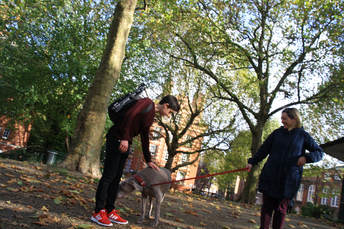Owning a dog: how to avoid barking up the wrong tree
 Photo by Finlay Roberts
Photo by Finlay Roberts
There are a lot of things you need to know about looking after your dogs at home. This
article is all about keeping your dogs healthy and safe, with some top tips too!
What your dogs can't eat
As well as dogs being prone to gum disease, many foods are poisonous to them too. Some examples of things they shouldn’t eat include mouthwash, caffeine and chocolate. Macadamia nuts can make dogs very ill; as can garlic, leeks or chives, and raisins and grapes. Like with small children, medicines should be kept out of reach. Always check food is safe, and that your pet is on the correct diet.
Keeping your dog safe in the sun
Dogs have a thick coat and in the summer it can get very hot, so make sure you keep some cool spray nearby. Try keeping your dog’s collar in the freezer for a few minutes before you take them outside for a walk; when you put the collar on, their neck will be nice and cool!
Keeping your dog safe in winter
Here are some safety tips for your dogs in the winter. Shorter days and shorter nights may mean that you’ll have to walk your dog in the dark. If so, invest in a reflective collar or a high visibility jacket for them - these range in price from £1 to £10. Glow in the dark dog balls are quite expensive, but are amazing and safe for nighttime walks. They typically range from £3 to £20.
Dog safety on bonfire night
With bonfire night and Halloween coming up, it’s important to remember that over 45% of dogs in the U.K. have shown a fear of fireworks. Make sure you keep them indoors if you or a neighbour are having a firework display in their garden. Around the week of bonfire night try keeping the radio on for your dog, as this can soothe them and distract them from the loud bangs and cracks, especially if you are not at home with your dog. Another helpful tip is making sure your pet has a place to hide where they feel safe and relaxed. This could be under furniture or in corners of rooms. Make sure your dog always has access to this hiding spot and that you don't try and lure them out, as that could stress them further. Never punish your pets when they feel scared, as this will make them scared of you. Do also be aware, though, that over half of the dogs in the U.K. aren't scared of fireworks - so if your dog isn’t, that’s perfectly normal.
Enjoy spending time with your dog!
Ella Hedges and Isabelle Iddenden Y7
article is all about keeping your dogs healthy and safe, with some top tips too!
What your dogs can't eat
As well as dogs being prone to gum disease, many foods are poisonous to them too. Some examples of things they shouldn’t eat include mouthwash, caffeine and chocolate. Macadamia nuts can make dogs very ill; as can garlic, leeks or chives, and raisins and grapes. Like with small children, medicines should be kept out of reach. Always check food is safe, and that your pet is on the correct diet.
Keeping your dog safe in the sun
Dogs have a thick coat and in the summer it can get very hot, so make sure you keep some cool spray nearby. Try keeping your dog’s collar in the freezer for a few minutes before you take them outside for a walk; when you put the collar on, their neck will be nice and cool!
Keeping your dog safe in winter
Here are some safety tips for your dogs in the winter. Shorter days and shorter nights may mean that you’ll have to walk your dog in the dark. If so, invest in a reflective collar or a high visibility jacket for them - these range in price from £1 to £10. Glow in the dark dog balls are quite expensive, but are amazing and safe for nighttime walks. They typically range from £3 to £20.
Dog safety on bonfire night
With bonfire night and Halloween coming up, it’s important to remember that over 45% of dogs in the U.K. have shown a fear of fireworks. Make sure you keep them indoors if you or a neighbour are having a firework display in their garden. Around the week of bonfire night try keeping the radio on for your dog, as this can soothe them and distract them from the loud bangs and cracks, especially if you are not at home with your dog. Another helpful tip is making sure your pet has a place to hide where they feel safe and relaxed. This could be under furniture or in corners of rooms. Make sure your dog always has access to this hiding spot and that you don't try and lure them out, as that could stress them further. Never punish your pets when they feel scared, as this will make them scared of you. Do also be aware, though, that over half of the dogs in the U.K. aren't scared of fireworks - so if your dog isn’t, that’s perfectly normal.
Enjoy spending time with your dog!
Ella Hedges and Isabelle Iddenden Y7

